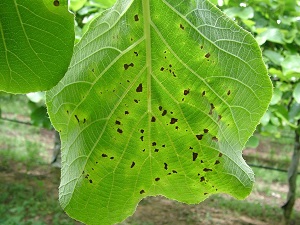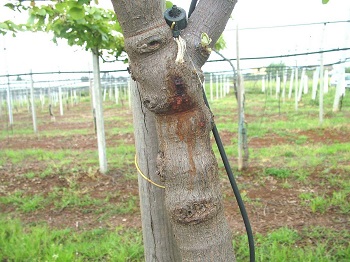Bacterial canker of kiwifruit
Bacterial canker of kiwifruit is caused by the bacteria Pseudomonas syringae pv. actinidiae (PSA).
There are different strains of PSA. Some are mild (like those detected in Victoria in 2011) and others are more aggressive. The effects of PSA depend on the:
- strain type
- vine cultivar
- weather conditions.

Symptoms of PSA
The early signs of PSA are dark spots on leaves of vines – but these may not always be present.
As the disease progresses, symptoms include:
- brown discoloration of buds
- dark brown spots surrounded by yellow haloes on leaves (Figure 1)
- cankers with reddish exudate on twigs, leaders and trunks (Figure 2)
- collapse of fruits.
Infected plants can eventually die.
Spread of disease

Over short distances PSA can be spread by:
- heavy rainfall
- strong winds
- mechanical transmission such as grafting
- animals.
Over long distances, PSA is spread by nursery stock. The PSA bacteria has also been found on pollen, but it's unclear whether pollen can cause infection.
Laboratory tests have been unable to infect fruit – fruit is not considered to be a way for PSA to be introduced or establish.
PSA can also affect weeds
PSA is also known to infect:
- Alternanthera philoxeroides (alligator weed)
- Paulownia tomentosa (paulownia)
- Setaria viridis (green foxtail)
All growers should practice good weed management to stop the spread of PSA.
Environmental conditions
Symptoms are likely to occur in wet and cool weather conditions. The bacteria can be present without symptoms in other conditions.
In other countries symptoms are usually expressed in spring and autumn when favourable conditions are present.
Where PSA is found
The disease is considered established in Victoria.
PSA disease is present in:
- Argentina
- Chile
- China
- France
- Italy
- Japan
- Korea
- New Zealand
- Portugal
Photo credits
All photos courtesy of Plant Protection Service of Emilia-Romagna region, EPPO
Reporting an unusual plant insect pest or disease
Report any unusual plant pest or disease immediately using our online reporting form or by calling the Exotic Plant Pest Hotline on 1800 084 881. Early reporting increases the chance of effective control and eradication.
Please take multiple good quality photos of the pests or damage to include in your report where possible, as this is essential for rapid pest and disease diagnosis and response.
Your report will be responded to by an experienced staff member, who may seek more information about the detection and explain next steps.
Report online